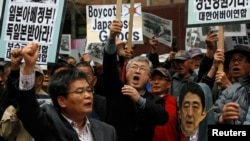South Korea has summoned Japan's ambassador in Seoul to protest recent visits by Japanese lawmakers and officials to a controversial shrine seen by many as a symbol of Tokyo's colonial past.
More than 160 lawmakers paid their respects at the Yasukuni Shrine on Wednesday. Three government ministers made a similar visit to the Shinto site in Tokyo last week.
The shrine honors 2.5 million of Japan's war dead, including some convicted war criminals from World War II. South Korea and China, which bore the brunt of Japan's aggression, regularly protest such visits.
South Korean Deputy Foreign Minister Kim Kyou-hyun said Thursday that Japan's ambassador was summoned to receive a protest about the visits and subsequent comments by Japanese Prime Minister Shinzo Abe.
"We can't understand that Japan is closing its eyes and ears to the history of invasion and colonial rule," said Kim. "Our government has been trying to open a bright future while putting the past behind. So we can't help but feel extremely regretful."
On Wednesday, Prime Minister Abe dismissed the criticism, saying his government will not "yield to any kind of intimidation." Japan's Kyodo news agency quotes him as saying it is only natural to "express one's respect and worship to precious souls of war dead."
China also lodged "solemn representations" to Japan about the visit. A foreign ministry spokesperson says Japanese leaders should learn to "respect the feelings of the people of China and other victimized countries."
Japanese Chief Cabinet Secretary Yoshihide Suga defended the visits, pointing out that past Japanese governments have apologized for their country's past.
"At one point, our nation caused great pain and suffering to many nations, especially people in Asian nations, in the war," he said. "Japanese governments have accepted these historical facts sincerely and have expressed our deepest remorse and heartfelt apologies."
The issue has further complicated Japan's already complex relationships with South Korea and China.
Tokyo-Beijing ties have dropped to their lowest point in years because of a recent flare-up in a long-standing dispute about a group of uninhabited islands in the East China Sea.
Separately, South Korea and Japan are engaged in a dispute about a Seoul-controlled island group in the Sea of Japan.
More than 160 lawmakers paid their respects at the Yasukuni Shrine on Wednesday. Three government ministers made a similar visit to the Shinto site in Tokyo last week.
The shrine honors 2.5 million of Japan's war dead, including some convicted war criminals from World War II. South Korea and China, which bore the brunt of Japan's aggression, regularly protest such visits.
South Korean Deputy Foreign Minister Kim Kyou-hyun said Thursday that Japan's ambassador was summoned to receive a protest about the visits and subsequent comments by Japanese Prime Minister Shinzo Abe.
"We can't understand that Japan is closing its eyes and ears to the history of invasion and colonial rule," said Kim. "Our government has been trying to open a bright future while putting the past behind. So we can't help but feel extremely regretful."
On Wednesday, Prime Minister Abe dismissed the criticism, saying his government will not "yield to any kind of intimidation." Japan's Kyodo news agency quotes him as saying it is only natural to "express one's respect and worship to precious souls of war dead."
China also lodged "solemn representations" to Japan about the visit. A foreign ministry spokesperson says Japanese leaders should learn to "respect the feelings of the people of China and other victimized countries."
Japanese Chief Cabinet Secretary Yoshihide Suga defended the visits, pointing out that past Japanese governments have apologized for their country's past.
"At one point, our nation caused great pain and suffering to many nations, especially people in Asian nations, in the war," he said. "Japanese governments have accepted these historical facts sincerely and have expressed our deepest remorse and heartfelt apologies."
The issue has further complicated Japan's already complex relationships with South Korea and China.
Tokyo-Beijing ties have dropped to their lowest point in years because of a recent flare-up in a long-standing dispute about a group of uninhabited islands in the East China Sea.
Separately, South Korea and Japan are engaged in a dispute about a Seoul-controlled island group in the Sea of Japan.





